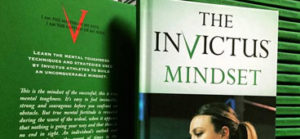
Being Aware is Half the Battle
Written by Justin Wright
Awareness is a simple, yet elusive concept. If I were to ask you whether or not you are aware of your surroundings, most of you would easily begin describing things around you. What if I asked whether or not you were aware of your feelings, your thoughts and your emotions? What about the things, internally, that motivate you? These questions may prove harder to answer. Awareness is not simply noticing and observing; it involves gaining a deeper understanding of your environment, those around you, their motivations, and your own reactions to these situations.
Awareness is one of the first skills I attempt to develop with my mindset clients. If you are not aware of your thoughts and feelings, how can you alter them? Awareness ultimately leads to understanding; how many arguments or disputes have occurred in your life due to a lack of understanding? Even if we simply discuss awareness with regard to fitness, you must be aware of positioning, how your body is moving, in order to correct that movement.
The Monkey Mind
If you have any experience with meditation, or any mindfulness practice, then you are well versed in the concept of the monkey mind. This concept describes our mind’s tendency to wander, to shift rapidly from thought to thought like honey bees moving from flower to flower. The benefit of mindfulness is the ability to gain awareness of this tendency, and ultimately bring the mind under control. Do you know how many thoughts flash through your mind on a daily basis?
Try this exercise: over the course of one day keep track of how many positive and negative thoughts you have. Use tally marks, a running number count, or whatever method is easiest for you. At the end of the day, look over this data. Realize also that these are only the thoughts present long enough to gain your attention. Our subconscious mind processes infinitely more information than our conscious mind ever notices.
Once you start to do this regularly, you will find that the total number of thoughts you record increases each day. You are practicing and developing the skill of awareness which will prove difficult at first! Much like the first time you tried a new exercise, the concept of awareness will be foreign, awkward, and challenging. Over time, your skills will improve and you will be more mindful of what is going on between your ears.
In much the same way as you can train your muscles to grow inside the gym, training your mind to better perceive your thoughts is a practice that will become more effective with time. The more you do this, the more clarity you will have as you go through your day; you may find that you are more productive, or that you can organize tasks and actions more effectively as you gain increased awareness of thought.
Understanding = Communication
Awareness does not simply affect our lives internally. By increasing our knowledge of thoughts and feelings, we can more effectively communicate with those around us and therefore bolster our relationships. Communication breakdowns occur for one of two reasons: either the message is misunderstood by the person receiving it, or the person sending the message does not translate their thoughts or feelings effectively in the first place. Either way, the term “lost in translation” summarizes this phenomenon well.
By increasing your awareness of your own thoughts and feelings, you will be better-positioned to interpret these things in conversations with others. As you gain control over your mind and your thoughts, it will be easier to interpret the thoughts expressed by peers. Awareness leads to empathy: the ability to better understand and share the feelings of those we interact with.
If you find that you are consistently misunderstanding others in conversation, or feel like you often miss the target when trying to get your point across, focus on trying to develop increased awareness in your own life first. Be more intentional with understanding your own thoughts and feelings. This is a valuable skill that will allow you to better connect with others.
Move Better
Now that you have a better understanding of how awareness can positively affect your mindset and your interactions, what can it do for you physically? When exercising, how often are you focusing on not just the movement you are doing, but also how you are doing it? When you receive coaching cues in class, are you making a temporary correction and reverting to old habits, or are you trying to change the way you do things to improve the future quality of that exercise?
Proprioception is defined as “perception or awareness of the position and movement of the body.” One thing that is common in all elite athletes is that they possess a high-degree of proprioception; they internalize instruction with ease because they have a deep understanding of how their bodies move. Whether or not you have any competitive aspirations, imagine how much more you can gain from your fitness journey if you can increase proprioception.
Spend time developing this awareness if you are currently lacking in that department. Focus on actually feeling which muscles are working when you move a certain way. Build a better connection with your feet, with your hands. Try to visualize how a movement should be performed, and then correlate the feeling of that movement with the correct position. These skills, like their mental counterparts, can be practiced. The more you focus energy and effort into building proprioception, the more you will get out of your workouts and the faster you will ultimately improve.
Why does any of this matter?
Despite these arguments, many of you are probably still thinking that your time and effort is better invested elsewhere. Maybe you don’t believe that increased awareness of your own thoughts can positively impact your relationships. Maybe you don’t currently correlate a lack of fitness with a lack of awareness. Maybe you are currently confusing being observant with being aware (just because you can see something, it doesn’t mean that you understand that thing).
Chances are, however, that there are areas of your life you are currently dissatisfied with. Many of you want to improve on the exact things I already mentioned: you want to strengthen your relationships with yourself and others, you want to increase your communication skills, and you want to be more fit. The beauty of developing awareness is that it paints a more vivid picture of what exactly needs to be changed. Furthermore, it often helps provide a blueprint for improvement. As you gain a better understanding of what you want to change in your life, the how becomes easier to understand as well.
Unless you first develop awareness, you will be shooting in the dark, and likely missing the target entirely. Awareness provides clarity, and will allow you to better focus your efforts towards continued self-improvement. Increased clarity will illuminate the ideal path for optimal change. Being aware truly is half the battle in the constant struggle to realize the best version of ourselves.
Is improved mindset one of your 2019 goals? We have a book for that! An individual’s outlook and resilience during the worst of times is the difference between those who succeed and those who succumb. The Invictus mindset is a commitment to maintaining control of your destiny without regard for the obstacles and hardships that are laid on your path.
